|
|
|
Sort Order |
|
|
|
Items / Page
|
|
|
|
|
|
|
| Srl | Item |
| 1 |
ID:
164555
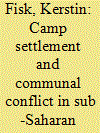

|
|
|
|
|
| Summary/Abstract |
Are areas that host encamped refugees more likely to experience communal conflict, and under what conditions? Building on insights from the refugee studies literature suggesting that settling refugees in camps can intensify intercommunal tension in host communities, this article investigates the effect of refugee encampment on the occurrence of communal conflict at the subnational level in sub-Saharan Africa. It first tests for a general relationship between the overall presence and population intensity of encamped refugees and communal conflict before assessing whether this relationship is moderated by local-level characteristics, including interethnic linkages and political and economic marginalization within the host region. The basic findings show that communal conflict occurs more frequently in regions where refugees are camp-settled. Tests for interactive effects indicate that refugee camps have a significant marginal effect on conflict only if they are located in areas with politically marginalized host groups. Origin country/host region ethnic ties are shown to exert significant moderating effects. Moreover, results from an extended set of analyses show that the form of refugee settlement matters, as the presence and population intensity of self-settled refugees are related to decreases in the occurrence of communal conflict.
|
|
|
|
|
|
|
|
|
|
|
|
|
|
|
|
| 2 |
ID:
124492
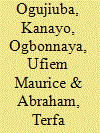

|
|
|
|
|
| Publication |
2013.
|
| Summary/Abstract |
The Arab Spring, a pro-democracy uprising that has been sweeping through North Africa and the entire Arab world since 2010, has been described as a cataclysmic revolutionary wave that has left the overthrow of political regimes in its wake. Studies have comprehensively x-rayed the political and socio-economic circumstances that gave rise to the uprising. Apart from the impact of the uprising on political developments and democratic governance in the Arab world in particular and the world in general, the circumstances that resulted in the revolutions constitute empirical security implications for Nigeria. This is the focus of this article. Using the Ibrahim Index of African Governance (IIAG) and other selected indicators, this article draws a comparative analysis of the key factors that led to the uprisings in Egypt, Libya and Tunisia, pointing out areas of social and security tensions in Nigeria. Based on these findings, it points out the urgency of and imperative for security sector reforms in Nigeria.
|
|
|
|
|
|
|
|
|
|
|
|
|
|
|
|
| 3 |
ID:
129469
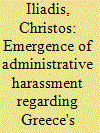

|
|
|
|
|
| Publication |
2013.
|
| Summary/Abstract |
This article is based on official, recently declassified documents to provide an analysis of the emergence of policies of discrimination applied against the Turks of Greek Thrace. It does this by unveiling the efforts of the local authorities to construct a coherent political project that would block the expansion of Turkish nationalism among minority Muslims. After certain historical events, this project became even more exclusionary. Crucial in this direction was the establishment of a secret, official council, its operation described here. The projects it formulated and put forward were decisive for the establishment of a regime of practices of administrative harassment, applied in Greek Thrace until the early 1990s but never officially recognized
|
|
|
|
|
|
|
|
|
|
|
|
|
|
|
|
| 4 |
ID:
159885
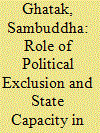

|
|
|
|
|
| Summary/Abstract |
Extant literature on intrastate conflict independently explores terrorism and civil war. However, both terrorism and civil war are probably parts of a continuum of intrastate conflict with the former at one end and the latter at the other end in terms of intensity. I argue that two factors play important roles in rebels’ decision-making calculus, namely, the size of their support base and state strength. Terrorism, as a strategy of the weak, is optimal when the rebel groups have little support among their audience and the state is strong. On the other hand, guerrilla warfare is an ideal strategy when such groups have a greater support base and the state is weak. The theoretical argument is tested on a dataset of Myanmar and six countries of South Asia and for 1970–2007.
|
|
|
|
|
|
|
|
|
|
|
|
|
|
|
|
| 5 |
ID:
133656
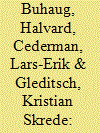

|
|
|
|
|
| Publication |
2014.
|
| Summary/Abstract |
Much of the recent research on civil war treats explanations rooted in political and economic grievances with considerable suspicion and claims that there is little empirical evidence of any relationship between ethnicity or inequality and political violence. We argue that common indicators used in previous research, such as the ethno-linguistic fractionalization (ELF) and the Gini coefficient for income dispersion, fail to capture fundamental aspects of political exclusion and economic inequality that can motivate conflict. Drawing on insights from group-level research, we develop new country-level indices that directly reflect inequalities among ethnic groups, including political discrimination and wealth differentials along ethnic lines. Our analysis reveals that these theoretically informed country profiles are much better predictors of civil war onset than conventional inequality indicators, even when we control for a number of alternative factors potentially related to grievances or opportunities for conflict.
|
|
|
|
|
|
|
|
|
|
|
|
|
|
|
|
|
|
|
|
|